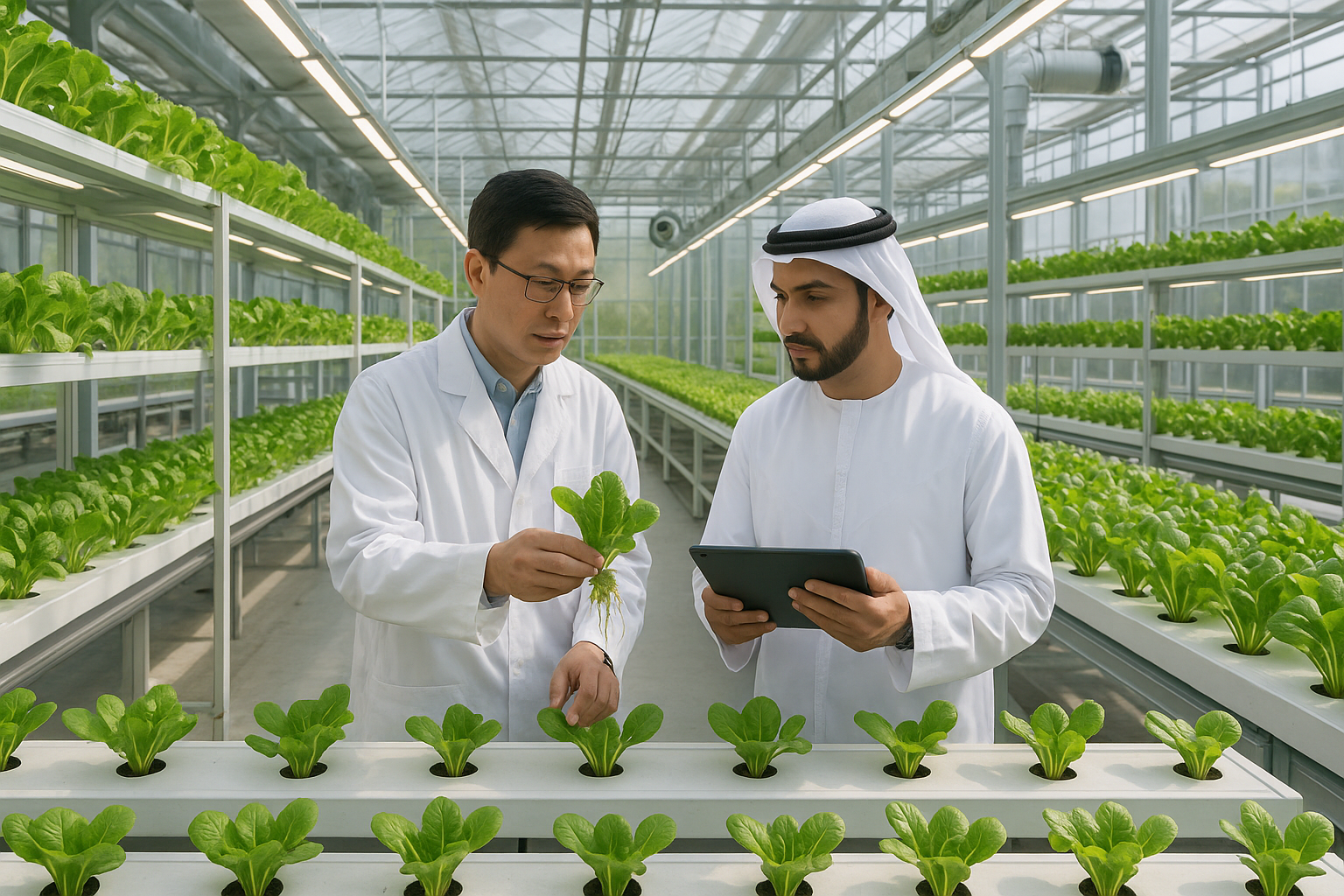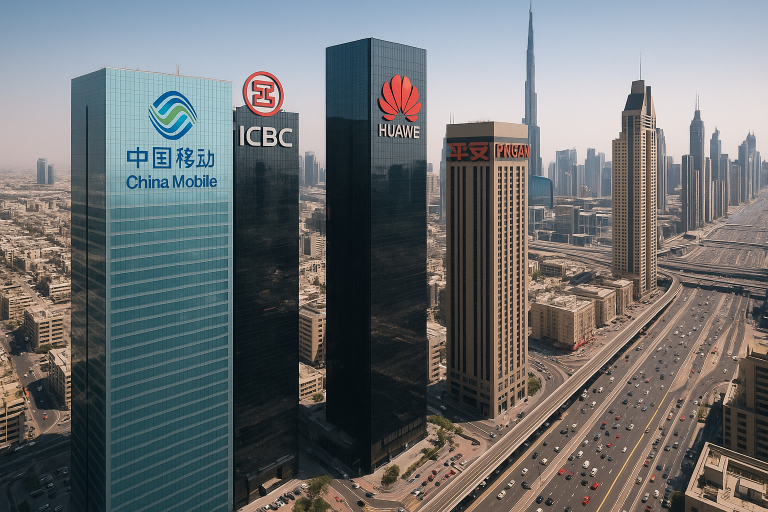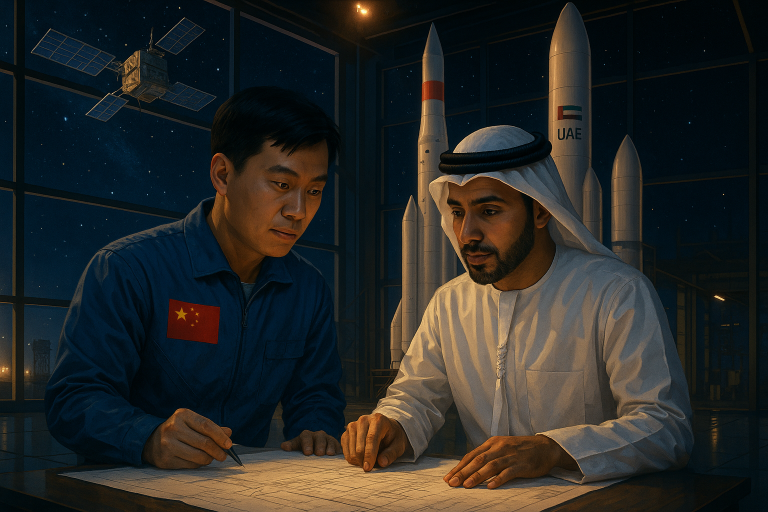Agricultural Innovation: Cultivating Food Security and Sustainability in the Desert
Introduction
In the heart of the Arabian desert, a quiet but profound revolution is taking place. Inside state-of-the-art, climate-controlled vertical farms, rows of lush, green vegetables grow under the glow of specialized LED lights, their roots nourished by nutrient-rich water. This scene, once the domain of science fiction, is now a reality in the United Arab Emirates, and it is a powerful symbol of the nation’s pioneering partnership with the People’s Republic of China in the field of agriculture. This collaboration is tackling one of the most critical challenges of the 21st century: ensuring food security in the face of climate change and resource scarcity. The China-UAE partnership in agriculture is a forward-thinking alliance that leverages Chinese technology and expertise to help build a sustainable, resilient, and productive agricultural sector in the UAE. This article explores this vital collaboration, examining the strategic imperative of food security for the UAE, the transformative role of Chinese agricultural technology (agritech), the importance of the bilateral food trade corridor, and the shared vision for a truly sustainable agricultural future.
The Challenge: Food Security in an Arid Nation
For the United Arab Emirates, a nation characterized by its arid climate, limited arable land, and scarce freshwater resources, food security has always been a paramount strategic concern. Historically, the country has been heavily reliant on imports to feed its growing population and vibrant economy, with some estimates suggesting that up to 90% of its food is sourced from abroad. While this model has been sustained by the nation’s wealth and its world-class logistics infrastructure, it also creates a strategic vulnerability to global supply chain disruptions, price volatility, and geopolitical instability, as the COVID-19 pandemic starkly illustrated.
In response, the UAE’s visionary leadership has made food security a top national priority. The National Food Security Strategy 2051 outlines an ambitious plan to transform the nation’s food system, aiming to climb to the top of the Global Food Security Index. The strategy is not based on attempting to replicate traditional, water-intensive agriculture in an unsuitable environment. Instead, it is a bold vision to leapfrog directly to the forefront of agricultural innovation, using cutting-edge technology to produce more food locally, sustainably, and efficiently. It is this tech-driven vision that has created the perfect conditions for a deep and synergistic partnership with China, a global powerhouse in the field of agritech.
The Solution: Chinese Agritech in the UAE
The collaboration between UAE entities and leading Chinese agritech companies and research institutions is turning the desert green. This partnership is bringing some of the world’s most advanced agricultural technologies to the UAE, tailored to meet the specific challenges of its environment.
Case Study 1: Controlled-Environment Agriculture (CEA)
The most visually striking and impactful area of cooperation is in Controlled-Environment Agriculture (CEA). This includes high-tech greenhouses and vertical farms. Chinese companies have partnered with Emirati counterparts to build and operate these advanced facilities, which create the perfect growing conditions for a wide variety of crops, from leafy greens and herbs to tomatoes and berries, all year round. Inside these structures, every element is precisely managed: temperature, humidity, light, and nutrients. Techniques like hydroponics (growing plants in water) and aeroponics (misting the roots with nutrient solutions) allow for the cultivation of crops with up to 95% less water than traditional field farming—a staggering saving in a water-scarce region. These farms are not only highly productive but also protect crops from pests and extreme weather, ensuring a stable and predictable harvest.
Case Study 2: Advanced Desert Farming
Beyond indoor farming, the partnership is also focused on making outdoor farming in arid conditions more viable. Chinese researchers have developed specialized techniques for “desert farming,” which are now being trialed and deployed in the UAE. This includes the development of new, more drought-resistant and salt-tolerant crop varieties that are better suited to the local conditions. It also involves the application of innovative soil enhancement technologies, which can improve the water-retention capacity and nutrient content of sandy desert soil. Combined with hyper-efficient irrigation systems, such as subsurface drip irrigation that delivers water directly to the plant roots to minimize evaporation, these techniques are pushing the boundaries of what can be grown in the desert.
Case Study 3: Sustainable Aquaculture
The partnership also extends to the “blue” economy. To enhance the local supply of protein and reduce pressure on over-exploited wild fish stocks in the Gulf, China and the UAE are collaborating on sustainable aquaculture. This involves the development of advanced fish farms, both onshore in recirculating aquaculture systems (RAS) and offshore. Chinese expertise in fish breeding, feed formulation, and disease management is helping to build a more productive and environmentally friendly aquaculture sector in the UAE, contributing another vital pillar to its food security strategy.
Beyond Local Production: The Food Trade Corridor
While the growth of local food production is a central goal, both nations recognize that a resilient food security strategy also requires a robust and diversified trade network. The China-UAE food trade corridor remains a vital component of the relationship. China is a major global producer and exporter of a vast range of food products, from grains and vegetables to processed foods, and it is a key supplier to the UAE market.
The strength of the logistics and supply chain partnership between the two countries is critical here. The efficient operation of the UAE’s ports and airports ensures a stable and reliable supply of food from China, a factor that proved essential during the global supply chain disruptions of recent years. This trade is not just one-way. As the UAE’s high-tech farms begin to produce a surplus of premium, high-quality produce, there is a significant opportunity to export these “Made in the UAE” products to China’s discerning consumer market, which places a high value on food safety, quality, and novelty.
The Future: A Sustainable Agricultural Ecosystem
The vision for the China-UAE agricultural partnership extends far into the future. The collaboration is now moving into the next generation of food technologies. This includes joint research and development in areas like alternative proteins (such as plant-based meat substitutes), the cultivation of microalgae as a sustainable source of food and feed, and the use of AI and big data to create “smart farms” that can optimize crop yields and resource management with unparalleled precision.
There is also a strong focus on the water-energy-food nexus. The future of agriculture in the UAE depends on making it even more sustainable. This involves integrating these advanced farms with renewable energy sources, creating solar-powered farms that have a minimal carbon footprint. It also means investing in innovative water technologies, from more efficient desalination processes to advanced water recycling systems within the farms themselves. The UAE China Chamber of Commerce (UECN) is playing a key role in this future, connecting the pioneers of agritech with investors, and linking food producers with trading companies, thereby helping to build the integrated ecosystem needed for this new sector to flourish.
Conclusion: Harvesting the Fruits of Partnership
The agricultural partnership between China and the UAE is a powerful and inspiring example of how technology and collaboration can be harnessed to solve one of humanity’s most fundamental challenges. It is a direct and effective response to the critical issue of food security in a changing world. By combining the UAE’s visionary leadership and investment with China’s technological prowess, the two nations are not just growing food in the desert; they are cultivating a new future for agriculture itself. They are demonstrating that environmental constraints do not have to be a barrier to self-sufficiency. This partnership is harvesting the fruits of innovation, resilience, and shared purpose, creating a model for a sustainable and food-secure world that will inspire nations for generations to come.







